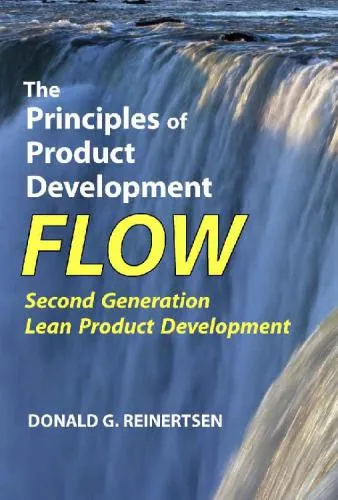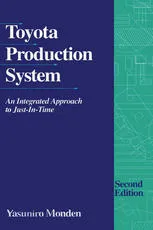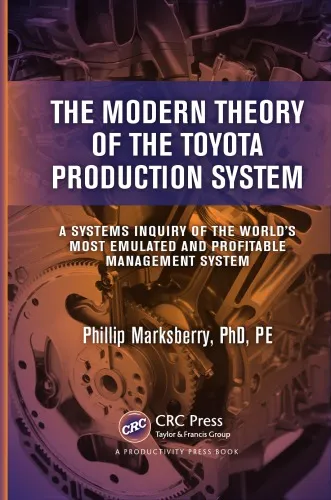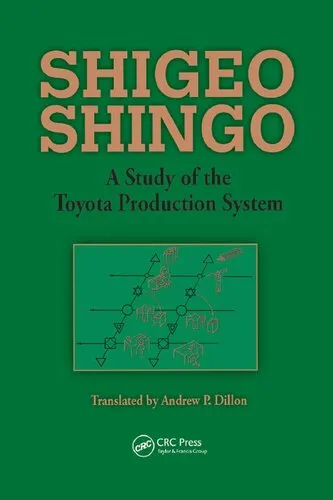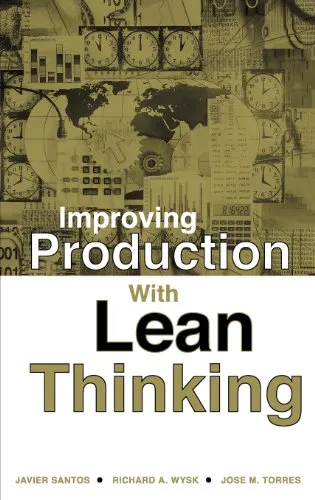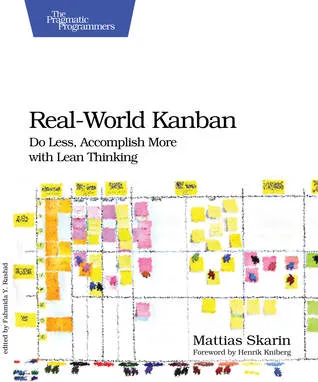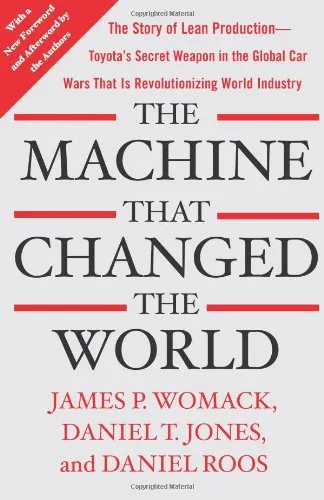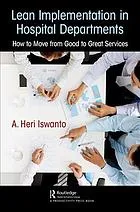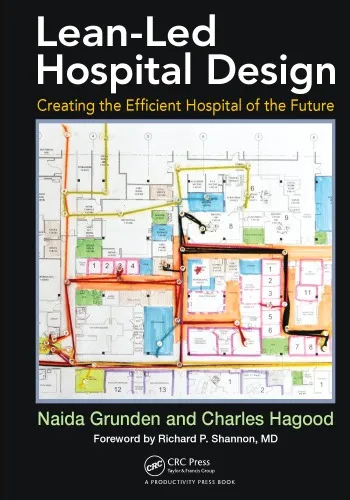Handbook of Lean Manufacturing in the Food Industry
4.0
بر اساس نظر کاربران

شما میتونید سوالاتتون در باره کتاب رو از هوش مصنوعیش بعد از ورود بپرسید
هر دانلود یا پرسش از هوش مصنوعی 2 امتیاز لازم دارد، برای بدست آوردن امتیاز رایگان، به صفحه ی راهنمای امتیازات سر بزنید و یک سری کار ارزشمند انجام بدینکتاب های مرتبط:
معرفی جامع کتاب 'Handbook of Lean Manufacturing in the Food Industry'
کتاب 'Handbook of Lean Manufacturing in the Food Industry' اثری جامع و ارزشمند است که به کوشش 'مایکل دادبریج' به نگارش درآمده و بهطور تخصصی بر پیادهسازی اصول Lean Manufacturing در صنعت غذا تمرکز دارد. این کتاب یکی از منابع کلیدی برای مدیران، مهندسان، و متخصصان صنعت غذا به شمار میرود، زیرا راهکارهای قابل اجرا، مطالعات موردی، و اصول بهینهسازی فرآیندها را به وضوح توضیح میدهد.
خلاصه مفصل کتاب
در این کتاب، Lean Manufacturing بهعنوان یک رویکرد سیستماتیک برای کاهش ضایعات و افزایش بهرهوری در صنعت غذا تشریح شده است. مایکل دادبریج با بهرهگیری از دانش خود، به بررسی چالشهای خاص این صنعت از جمله حساسیت بالای زمان، مسایل ایمنی غذا، و مدیریت زنجیره تأمین پرداخته است. در فصلهای مختلف این کتاب، خوانندگان با تکنیکهایی نظیر Just-In-Time، Kaizen، 5S، و Value Stream Mapping آشنا میشوند و یاد میگیرند چگونه این متدها را با موفقیت در فرآیندهای تولیدی و عملیاتی خود پیادهسازی کنند.
کتاب بهگونهای طراحی شده است که هم تئوری و هم کاربرد عملی اصول Lean را شامل شود. هر فصل حاوی مثالهای واقعی، نمودارها، و توصیههای عملی است که به خوانندگان کمک میکند درک بهتری از مفاهیم پیدا کنند و آنها را بهصورت گامبهگام در سازمان خود اجرا کنند.
نکات کلیدی کتاب
- توضیح جامع مبانی Lean Manufacturing و اهمیت آن در صنعت غذا.
- ارائه راهکارهای عملی برای افزایش کارایی و کاهش ضایعات.
- بررسی مطالعات موردی موفق و چگونگی شناسایی نقاط ضعف سازمان.
- یادگیری تکنیکهایی مانند Kanban و Total Productive Maintenance.
جملات مشهور از کتاب
"Sustainability in lean manufacturing is not just about being environmentally friendly; it’s about building a resilient system."
"The food industry faces unique challenges in adopting Lean principles, but the rewards far outweigh the efforts."
اهمیت این کتاب
کتاب 'Handbook of Lean Manufacturing in the Food Industry' تنها یک راهنمای عملی نیست؛ بلکه مسیری برای تحول در صنعت غذا به شمار میآید. اهمیت این کتاب در ارائه ابزارها و دانش برای حل مشکلات واقعی است که مدیران و تولیدکنندگان روزانه با آنها مواجه هستند. با توجه به تغییرات سریع بازار، فشارهای رقابتی، و نیاز به رعایت استانداردهای کیفیت بالا، Lean Manufacturing میتواند بهعنوان یک راهکار موثر برای بهبود عملیات و ایجاد ارزش در سازمانها معرفی شود.
خواندن این کتاب به تمامی فعالان صنعت غذا، از تیمهای مدیریت ارشد گرفته تا متخصصان خط تولید توصیه میشود. این اثر میتواند افق جدیدی برای بهبود سازمانی و عملیاتی باز کند و در نهایت به ایجاد یک فرهنگ کاری مقاوم و موثر منجر شود.
Introduction
The food industry is one of the most dynamic and complex sectors in the global economy. With rising consumer expectations, stricter regulations, and increasing pressures on cost and sustainability, food manufacturers are continuously challenged to innovate and optimize their operations. "Handbook of Lean Manufacturing in the Food Industry" serves as a comprehensive guide to implementing Lean principles within this sector, addressing its unique challenges and offering actionable strategies to streamline processes and improve productivity.
This book bridges the gap between traditional Lean manufacturing frameworks and the specific needs of the food production environment. While Lean principles originated in the automotive industry, this handbook adapts them for applicability to an industry where perishability, traceability, and hygiene are critical considerations. Whether you are an industry professional, an academic, or a student eager to learn about Lean concepts in real-world scenarios, this book is tailored to provide deep insights and practical examples.
Detailed Summary of the Book
The "Handbook of Lean Manufacturing in the Food Industry" is structured to take readers on a step-by-step journey toward understanding and mastering Lean practices. Starting with foundational principles of Lean thinking, the book progresses to specialized applications in food production, exploring topics such as waste elimination, inventory management, and quality assurance.
The book delves into the key tools and methodologies of Lean, including Value Stream Mapping (VSM), Kaizen, 5S, and Just-in-Time (JIT) systems. It highlights how these tools can be adapted to address specific issues in the food industry, such as managing the supply chain for perishable goods, ensuring food safety, and reducing energy waste. With each chapter, readers discover practical strategies supported by case studies from real-world food manufacturing operations.
Additionally, the handbook discusses emerging trends in the sector, such as digital transformation, automation, and the integration of Lean with sustainability practices. The book emphasizes a holistic approach, demonstrating how Lean can contribute not only to financial efficiency but also to environmental and social responsibility in food production.
Key Takeaways
- Comprehensive overview of Lean manufacturing principles tailored specifically for the food industry.
- Step-by-step instructions for implementing Lean methodologies, including tools like 5S, JIT, and VSM.
- Insights into tackling unique challenges in food production, including perishability, traceability, and compliance with food safety standards.
- Real-world case studies illustrating the tangible benefits of Lean in food manufacturing operations.
- Emphasis on sustainability, showcasing how Lean practices can align with environmental goals.
- Actionable strategies to improve workflow efficiency, reduce waste, and boost overall productivity.
Famous Quotes from the Book
"In the food industry, Lean is not just a strategy; it is a mindset–one that prioritizes value creation, waste elimination, and customer satisfaction above all else."
"A truly Lean food enterprise doesn't just reduce costs; it enhances product quality, shortens lead times, and fosters a culture of continuous improvement."
"Every form of waste in food manufacturing is an opportunity to redesign processes, leveraging the power of Lean to build a resilient, efficient, and competitive operation."
Why This Book Matters
The food industry is unique in its complexity, demanding innovative approaches to remain competitive while adhering to regulatory standards and meeting consumer demands. This book is not just another technical manual; it is a solution-oriented guide that targets the pain points of food manufacturers.
By adopting Lean methodologies, companies can achieve substantial reductions in waste and inefficiency, making it possible to produce high-quality products while maintaining profitability. Furthermore, in an era where sustainability is becoming a vital business priority, Lean provides a powerful toolkit to minimize environmental impact and align operations with sustainable development goals.
This book stands out for its practical focus, ensuring that Lean concepts are not merely theoretical but also immediately applicable to real-world scenarios. Its balanced approach makes it suitable for both novices and experienced professionals. Above all, "Handbook of Lean Manufacturing in the Food Industry" equips readers with the knowledge and confidence to initiate meaningful change in their organizations, fostering a culture of continuous improvement that benefits both the company and the consumer.
دانلود رایگان مستقیم
شما میتونید سوالاتتون در باره کتاب رو از هوش مصنوعیش بعد از ورود بپرسید
دسترسی به کتابها از طریق پلتفرمهای قانونی و کتابخانههای عمومی نه تنها از حقوق نویسندگان و ناشران حمایت میکند، بلکه به پایداری فرهنگ کتابخوانی نیز کمک میرساند. پیش از دانلود، لحظهای به بررسی این گزینهها فکر کنید.
این کتاب رو در پلتفرم های دیگه ببینید
WorldCat به شما کمک میکنه تا کتاب ها رو در کتابخانه های سراسر دنیا پیدا کنید
امتیازها، نظرات تخصصی و صحبت ها درباره کتاب را در Goodreads ببینید
کتابهای کمیاب یا دست دوم را در AbeBooks پیدا کنید و بخرید
1478
بازدید4.0
امتیاز0
نظر98%
رضایتنظرات:
4.0
بر اساس 0 نظر کاربران
Questions & Answers
Ask questions about this book or help others by answering
No questions yet. Be the first to ask!


